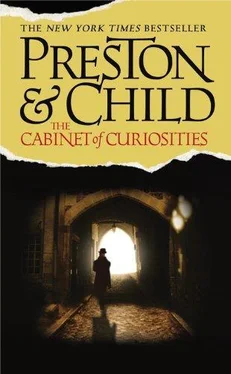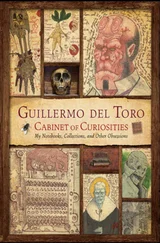Douglas Preston - The Cabinet of Curiosities
Здесь есть возможность читать онлайн «Douglas Preston - The Cabinet of Curiosities» весь текст электронной книги совершенно бесплатно (целиком полную версию без сокращений). В некоторых случаях можно слушать аудио, скачать через торрент в формате fb2 и присутствует краткое содержание. Жанр: Триллер, на английском языке. Описание произведения, (предисловие) а так же отзывы посетителей доступны на портале библиотеки ЛибКат.
- Название:The Cabinet of Curiosities
- Автор:
- Жанр:
- Год:неизвестен
- ISBN:нет данных
- Рейтинг книги:3 / 5. Голосов: 1
-
Избранное:Добавить в избранное
- Отзывы:
-
Ваша оценка:
- 60
- 1
- 2
- 3
- 4
- 5
The Cabinet of Curiosities: краткое содержание, описание и аннотация
Предлагаем к чтению аннотацию, описание, краткое содержание или предисловие (зависит от того, что написал сам автор книги «The Cabinet of Curiosities»). Если вы не нашли необходимую информацию о книге — напишите в комментариях, мы постараемся отыскать её.
The Cabinet of Curiosities — читать онлайн бесплатно полную книгу (весь текст) целиком
Ниже представлен текст книги, разбитый по страницам. Система сохранения места последней прочитанной страницы, позволяет с удобством читать онлайн бесплатно книгу «The Cabinet of Curiosities», без необходимости каждый раз заново искать на чём Вы остановились. Поставьте закладку, и сможете в любой момент перейти на страницу, на которой закончили чтение.
Интервал:
Закладка:
The heat was a physical force, a wall. Standing on the street corner, Pendergast’s gaze lingered appreciatively on the fire engine: a big black boiler on carriage wheels, belching steam, Amoskeag Manufacturing Company in gold letters on its sweating sides. Then he turned toward the onlookers. Would Leng be among them, admiring his handiwork? No, he would have been long gone. Leng was no pyromaniac. He would be safely ensconced in his uptown house, location unknown.
The location of the house was a great question. But another, perhaps more pressing, question remained: where had Leng moved his laboratory?
There was a tremendous, searing crack; roof timbers collapsed inward with a roiling shower of sparks; an appreciative murmur rose from the crowd. With a final look at the doomed structure, Pendergast began threading his way through the crowd.
A little girl rushed up, no older than six, threadbare and frighteningly gaunt. She had a battered straw broom in her hand, and she swept the street corner ahead of him industriously, clearing away the dung and pestilential garbage, hoping pathetically for a coin. “Thank you,” Pendergast said, tossing her several broad copper pennies. She looked at the coins, eyes wide at her good fortune, then curtsied awkwardly.
“What’s your name, child?” Pendergast asked gently.
The girl looked up at him, as if surprised to hear an adult speak to her in a solicitous tone. “Constance Greene, sir,” she said.
“Greene?” Pendergast frowned. “Of Water Street?”
“No, sir. Not — not anymore.” Something seemed to have frightened the girl, and, with another curtsy, she turned and melted away down a crowded side street.
Pendergast stared down the foul street and its seething crowds for some time. Then, with a troubled expression on his face, he turned and slowly retraced his steps. A barker stood in the doorway of Brown’s Restaurant, delivering the bill of fare in a loud, breathless, ceaseless litany:
Biledlamancapersors.
Rosebeefrosegoorosemuttonantaters—
Biledamancabbage, vege tay bles—
Walkinsirtakaseatsir.
Pendergast moved on thoughtfully, listening to the City Hall bell toll the urgent fire alarm. Making his way to Park Street, he passed a chemist’s shop, closed and shuttered, an array of bottles in diverse sizes and colors decorating the window: Paine’s Celery Compound; Swamp Root; D. & A. Younce’s Indian Cure Oil (Good for Man and Beast).
Two blocks down Park, he stopped abruptly. He was fully attentive now, eyes open to every detail. He had painstakingly researched this region of old New York, and the fog of his memory construct retreated well into the distance. Here, Baxter and Worth Streets angled in sharply, creating a crazy-quilt of intersections known as the Five Points. In the bleak landscape of urban decay that stretched before him, there was none of the carefree revelry Pendergast had found earlier, along Bowery.
Thirty years before, in the 1850s, the “Points” had been the worst slum in all New York, in all America, worse even than London’s Seven Dials. It remained a miserable, squalid, dangerous place: home to fifty thousand criminals, drug addicts, prostitutes, orphans, confidence men, villains of all shape and description. The uneven streets were broken and scored into dangerous ruts, brimming with garbage and offal. Hogs wandered about, rooting and wallowing in the fouled gutters. The houses seemed prematurely aged, their windows broken, tarpaper roofs hanging free, timbers sagging. A single gas lamp threw light into the intersection. On all sides, narrow streets marched off into endless darkness. The doors of the first-floor taverns were flung wide against the summer heat. The smells of liquor and cigar smoke issued forth. Women, bare-breasted, lolled in the doorways, exchanging obscene jeers with whores in the neighboring saloons or soliciting passersby in lurid tones. Across the way, nickel-a-night flophouses, riddled with vermin and pestilence, sat between the shabby cow-sheds of fencers of stolen goods.
Pendergast gazed carefully around at the scene, scrutinizing the topography, the architecture, for any clue, any hidden link that a mere study of historical records could not provide. At last he turned eastward, where a vast, five-story structure sat, decayed and listing, dark even in the light of the gas lamp. This was the former Old Brewery, at one time the worst of all the Five Points tenements. Children who had the misfortune to be born within were known to pass months or even years without tasting the outside air. Now, thanks to the efforts of a charitable group, it had been rebuilt as the Five Points Mission. An early urban renewal project for which, in 1880, the good Dr. Enoch Leng had volunteered his medical services, pro bono. He had continued to work there into the early ’90s, when the historical record on Leng vanished abruptly.
Pendergast walked slowly toward the building. An ancient sign for the Old Brewery remained painted along its upper story, dominating the far newer and cleaner Five Points Mission sign beneath. He considered entering the building, then decided against it. There was another visit he had to make first.
Behind the Five Points Mission, a tiny alley ran north into a dark cul-de-sac. Moist, fetid air seeped out from the darkness. Many years before, when the Points region had been a marshy pond known as the Collect, Aaron Burr had installed a large subterranean pump for the natural springs at this spot, founding the New Amsterdam Water Company. The pond grew increasingly foul, however, and eventually had been filled in to make way for tenements.
Pendergast paused thoughtfully. Later, this alleyway had been known as Cow Bay, the most dangerous street in the Five Points. It had been crowded with tall wooden tenements with names like “Brickbat Mansion” and “The Gates of Hell,” tenanted by violent alcoholics who would stab a man for the clothes on his back. Like many structures in the Five Points, these were warrens of vile-smelling chambers, honeycombed with secret panels and doors that connected to other houses on adjoining streets by networks of underground passageways, allowing criminals easy escape from pursuing law enforcement. In the mid-nineteenth century, the street had averaged a murder a night. Now it was home to an ice delivery company, a slaughterhouse, and an abandoned substation of the city’s waterworks, shut down in 1879 when the uptown reservoir rendered it obsolete.
Pendergast moved on another block, then turned left onto Little Water Street. At the far corner was the Five Points House of Industry, the other orphanage graced with the medical attention of Enoch Leng. It was a tall Beaux Arts building, punctuated along its north end by a tower. A small rectangular widow’s walk, buttressed by iron fencing, sat atop its mansard roof. The building looked woefully out of place among the shabby wooden houses and ramshackle squatteries.
He stared up at the heavy-browed windows. Why had Leng chosen to lend his services to these two missions, one after the other, in 1880—the year before Shottum’s Cabinet burned? If he was looking for an endless source of impoverished victims whose absence would cause no alarm, the cabinet was a better choice than a workhouse. After all, one could have only so many mysterious disappearances before someone grew suspicious. And why had Leng chosen these missions in particular? There were countless others in lower Manhattan. Why had Leng decided to work — and, presumably, draw his pool of victims — from this spot?
Pendergast stepped back onto the cobbles, glancing up and down the lane, thinking. Of all the streets he had traveled, Little Water Street was the only one no longer extant in the twentieth century. It had been paved over, built upon, forgotten. He had seen old maps that showed it, naturally; but no map ever drawn had superimposed its course onto present-day Manhattan…
Читать дальшеИнтервал:
Закладка:
Похожие книги на «The Cabinet of Curiosities»
Представляем Вашему вниманию похожие книги на «The Cabinet of Curiosities» списком для выбора. Мы отобрали схожую по названию и смыслу литературу в надежде предоставить читателям больше вариантов отыскать новые, интересные, ещё непрочитанные произведения.
Обсуждение, отзывы о книге «The Cabinet of Curiosities» и просто собственные мнения читателей. Оставьте ваши комментарии, напишите, что Вы думаете о произведении, его смысле или главных героях. Укажите что конкретно понравилось, а что нет, и почему Вы так считаете.










